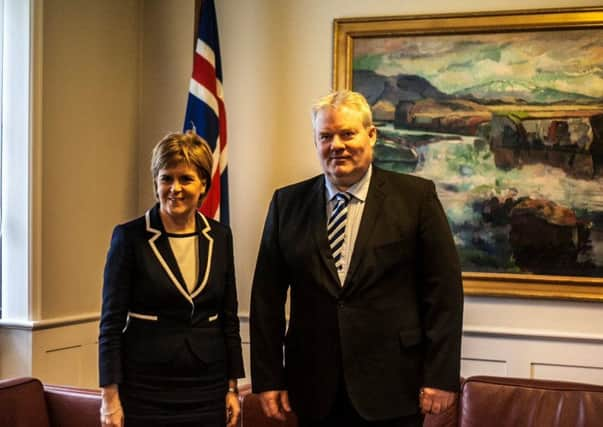Lesley Riddoch: Countries of the Arctic are our natural allies


Last week Nicola Sturgeon made a keynote speech to two thousand delegates from 50 countries discussing Arctic development and protection at a conference in Reykjavik. This first Arctic Circle speech by a Scottish First Minister certainly had symbolic clout and set smartphone cameras clicking and female politicians from every part of the Arctic queuing up to meet her.
On the official side, the First Minister signed an agreement for VisitScotland and the Icelandic Tourist Board to share information – and no wonder. This northern haven of creative people, active volcanoes, jailed bankers and improbably talented football players has become a tourist magnet attracting over 1 million tourists last year (three times the population.)
Advertisement
Hide AdAdvertisement
Hide AdTourism now contributes more to the Icelandic economy than fishing and that has big ecological implications since 70 per cent of food has traditionally been imported. The financial crash of 2008 encouraged the creation of geo-thermally heated poly tunnels to substitute for unaffordable, foreign supplies of fruit and vegetables. Still there’s a fear that imported goods needed to service mass tourism could destroy the Arctic – and the precious Polar ice.
So too a session on mental health in Greenland where 11 per cent of suicides are by teenagers – ten times higher than the Canadian average. A Danish doctor observed Greenlanders are caught between their own indigenous values –upholding harmony with nature, the importance of feelings, education by elders and the primacy of the family -- and western values which encourage the domination of nature, the division of soul and body and education by professionals. The developing Arctic consensus is that learning is best achieved via elders in a family context and a stable social situation – not amidst competition, professionalism and economic turmoil. Surprisingly perhaps, these insights mirror the latest thinking about disempowerment in Scotland’s deprived urban communities.
Nicola Sturgeon spoke about Scotland and Iceland’s shared commitment to tackling climate change with justifiable authority -- Scotland’s 2020 emissions targets have been achieved 6 years early thanks to expansion of wind-power and hydro. Indeed, while Norwegian emissions are currently rising (albeit from a very low base) Scotland’s are falling (from a fairly high base.)
A proposed North Atlantic Power System would turn the Arctic and sub-Arctic into Europe’s “green battery” – but Scotland won’t be able to feed in energy without backing the UK Government which appears reluctant, even though the project is cheaper than the heavily subsidized Hinkley C nuclear power station. Quite obviously this should be a massive opportunity for Scotland but if we aren’t actively involved now, Scotland will be reduced to an energy stepping stone not a green energy contributor – with all the extra jobs, investment and carbon-saving that would mean.
Meanwhile new shipping routes have been made possible by global warming which explains the new interest by shipping-dominated Korea, Arctic-facing Maine and Chinese investors.
But I counted only two Scots including Angus MacNeil MP, amongst a mountain of speakers from unlikely countries like Korea, Switzerland, Brazil and China. Indeed American companies and state officials appeared to provide more speakers and questioners than the combined might of the more reticent Arctic nations.
That’s clearly because the Americans understand the Arctic is the next (and perhaps the last) area for economic development and they now have formal clout because Arctic Alaska makes the USA an Arctic nation. The announcement of a generously funded and US-located Polar Institute said a lot about the northerly focus of American interests – mirrored by similar activity in Russia. Fortunately though, small Arctic nations like Iceland, Greenland, Canada and Norway are focused and muscular enough to handle super state interest.
And this is where the possibility of Nordic and Arctic Scotland comes in. A new online photo-magazine - Jewels of the North Atlantic (JoNA) -- aims to launch next year with photo-driven pieces exploring the common themes, landscapes and pressures facing all North Atlantic communities.
Advertisement
Hide AdAdvertisement
Hide AdAccording to editor Vilborg Einarsdottir; ”We chose to include Scotland and and Arctic-facing Maine because both are re-discovering their Nordic roots and because their people think more like folk from North Atlantic nations than the southern-focused states to which they formally belong. Scotland and the Arctic nations have a common culture and shared history. And if that feels a bit thin, what is the Arctic but a bunch of people with a shared history and culture? Our languages are different, our geography straddles the globe and there are huge distances between all Arctic “neighbours.” Still, we have common interests.”
Like self-determination for minority nations.
The Arctic is full of tiny independent nations, devolved sub-nations and dispersed communities with strong cultural identities. Most have more powerful parliaments than Scotland -- indeed the Danish family of nations offers a far more relaxed model than the controlling UK - accepting diversity and devolution instead of denying it.
Surely if Maine can be an Arctic player and the Baltic nations can be Nordic Council observers, why can’t Scotland? As Martin Stemre of the Nordic Atlantic cooperation body NORA put it; “Scotland is as Nordic or Arctic as it wants to be.”
Hopefully Nicola Sturgeon’s first journey to the High North will not be her last.